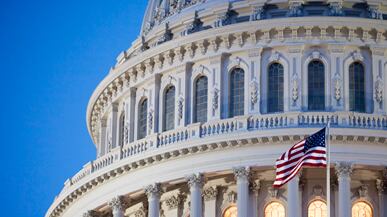Behind the photo ops of Republicans visiting the White House and images of Joe Biden buckling down on bipartisan budget negotiations lies a grim reality: Neither Democrats nor Republicans are willing to budge in what is quickly devolving into a high-stakes game of legislative chicken. And time is running short.
At issue is the momentous question of whether the United States will default on its debt, a potentially catastrophic possibility now scheduled to become reality on August 2. To avoid such an outcome if the debt ceiling isn’t raised, leaders of both parties will have to find a way around the calcifying paralysis that is now choking Beltway politics.
The good news, if there is any, is that Republicans and Democrats on the Hill at least agree that Washington has a huge problem. With $14.3 trillion in federal debt already on the books, Congress must approve more deficit spending or allow the government to renege on its obligations, both to foreign creditors and to Americans expecting their Social Security checks, Medicare premiums or anything else Uncle Sam pays for these days.
“People in my district, they pay their bills, they don’t walk away from their debts,” says Rep. Elijah Cummings, the veteran Democrat from Maryland. “This country shouldn’t walk away from its debts, either. I hope the Republicans understand that.”
Rep. Tom Price, the chairman of the Republican Policy Committee and practically the political polar opposite of Cummings, does understand that.
“I think it has to get taken care of,” Price says of the looming debt-ceiling deadline.
But that’s where the bad news begins, because neither Cummings and Price, nor President Obama and House Speaker John Boehner, nor almost any Democrat or Republican in Washington can agree on how to allow the government to continue to function, while also fashioning a politically feasible way to bring down the country’s record deficits.
Democrats say that along with steep spending cuts, taxes must be increased, at least on the wealthiest Americans, to help balance the federal budget. “I don’t know how the math works without revenue raisers,” says Rep. Joe Courtney, a Democrat from Connecticut who counts public school teachers among his strongest supporters. “It’s not even an ideological position, it’s just math.”
Both sides know what they won’t give, but neither can say what it could relinquish.

The White House, too, insists that raising taxes, particularly on the top earners, must factor into the equation for lowering the deficit. With tax rates at their lowest levels in more than 50 years, the president says it’s only fair that higher-income Americans should go back to paying more.
But while Boehner maintains that “everything must be on the table” for any long-term budget discussions with the Democrats, tax increases are the one item he wants left out of the kitchen entirely.
With 87 House Republican freshmen in his unwieldy caucus—many of whom are under pressure from their budget-obsessed Tea Party supporters—it’s not surprising that the speaker’s starting point ends at the idea of increasing revenues.
Rep. Rob Woodall is a freshman Republican from Georgia and one of the newest members appointed to the House Budget Committee. As far as he is concerned, raising taxes to bring down the deficit is a non-starter.
“We don’t have a revenue problem in this country, we have a spending problem in this country and I am not persuaded that the president and I view the magnitude of the spending crisis in the same way,” Woodall said after meeting with Obama at the White House this week.
Woodall says his class of Republicans, which he calls “the accountability class,” does not view this debate as one just about money, but as a much larger fight over the scope and the role of the federal government in people’s lives.
“It’s not gamesmanship or some clever negotiation. This is a discussion about the coming demise of America if we don’t change our habits,” Woodall says.
The impasse over the debt ceiling among rank-and-file members of Congress comes after several bipartisan flops in the search for consensus.
Neither the Biden commission, which has already met five times, nor the much-celebrated Simpson- Bowles commission, nor the Senate’s now defunct Gang of Six, nor any other body, official or unofficial, has produced a budget blueprint that a critical mass of politicians in Washington can live with.
And inside the latest meetings between the president and members of Congress, staffers say both sides know what they won’t give, but neither can say what it could relinquish to steer the country away from the financial cliff that seems to await in early August.
A Democratic leadership official briefed on the negotiations predicts that only the shadow of an expiring deadline and audible jitters from the financial markets will force either side’s hand in the White House talks.
“Right now, they’re 300 miles away from anywhere,” the official says.
Those jitters grew louder Thursday afternoon, when Moody’s Investors Service warned that it could downgrade the nation’s top AAA credit rating in the coming weeks based on the “very small but rising risk" that the United States could default on its obligations.
For his part, Price says he liked what he heard from Obama when he met with Republicans.
“I always leave a meeting with the president appreciating his words, because he usually says exactly the right thing,” Price says. “But then he never does the right thing. His actions rarely match his words. If his actions match his words this time, we’re in great shape.”
But then he turned downbeat: “If past is prologue, then there’s little reason for hope.”
Patricia Murphy is a writer in Washington, D.C., where she covers Congress and politics.






